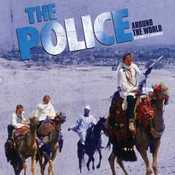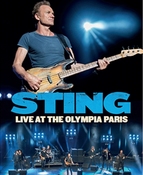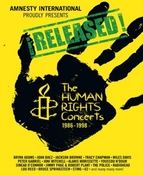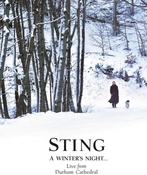FEATURE: The Grotesque
- Feature Film

Soundbites
Sting plays an enigmatic butler known as Fledge in 'The Grotesque' (1996), a pitch black comedy directed by John-Paul Davidson. The film marks Sting's first dramatic big screen appearance with his wife Trudie Styler (who plays his wife Doris in the film). 'The Grotesque' was produced by Styler for Xingu films, Sting and Trudie's fledgling production company. Xingu films also made 'Boys From Brazil' in 1993, a documentary also produced by Davidson which offers a haunting look at real street dwellers who are brought to Europe to become male prostitutes, and Michael Apted's 'Moving The Mountain' in 1995, a powerful docu-drama that chronicles the student democracy movement in Tiananmen Square uprising in China. Set in rural England in 1949, 'The Grotesque' features Alan Bates and Teresa Russell as an aristocratic couple whose eccentric and passionless lives are torn asunder after Fledge and Doris motor onto their estate (known as Crook House). Written with macabre glee by Patrick McGrath (who adapted the screenplay from his novel of the same name), the sobering details of a grisly murder are offset by comically blatant double entendres and recurrent phallic symbols - including an omnipresent dinosaur bone that may or not be the murderer's smoking gun. While the ambiguous circumstances surrounding the crime at Crook House drive the plot of 'The Grotesque' the equally ambiguous sexualities and intersecting lusts of the characters provide a full measure of the film's entertainment.
All This Time CD-ROM
Backgrounder
Review from The New York Times by Janet Maslin
Combining a lordly country setting and a grisly imagination, the dark comedy "Gentlemen Don't Eat Poets" tries quite literally to skewer the British upper classes. One character winds up a vegetable, and another actually becomes dinner in this uneven satire adapted by Patrick McGrath from his novel "The Grotesque." It does live up to that title.
As directed by John-Paul Davidson in the kind of comically peaceful setting that features geese waddling across the screen in long shot, the film pits the heartily peculiar Sir Hugo Coal (Alan Bates, in a good, spirited performance) against various threats to his dominion. Especially threatening in their quietly sinister way are the new butler, Fledge (Sting), and his watchful; mousy wife (Trudie Styler). Fledge can be terribly correct in ways that make the household tingle.
It doesn't take long for Fledge to size up the sexual predilections of the gentry and begin bringing out the decadence in everyone. He attaches himself so firmly to Lady Harriet Coal (Theresa Russell), the wife who does not share Sir Hugo's fascination with dead animals, that she is graphically transformed from matron to vamp. Sting endlessly shows off his insinuating smile, but he doesn't breathe much variety into this role. He is able to spend the latter part of the film provoking the Coals by wearing either impertinently aristocratic clothing (to irk Sir Hugo) or nothing at all.
Meanwhile, Ms. Russell underscores the uncertainness of the film's acting with an absurd great-lady performance that wouldn't pass muster in a high school play. But Mr. Bates, the only leading player here to show real zest, brings some humour to Sir Hugo's eccentricities. His hobby of collecting bones begins seem most unfortunate once the story has encompassed cannibalism and has police inspectors looking for spare parts. The film also involves toads, vanishing of a young poet who had the effrontery to propose marriage to Sir Hugo's beloved daughter.
This film's mood of strained sauciness is a reminder of "Cold Comfort Farm", which brought a much lighter touch to its comparably mischievous view of declining British aristocracy. That film held more surprises than this one, which has delivered all its worthwhile barbs long before a group of monstrous patricians sits down to enjoy a strangely gamy ham for dinner. While not exactly wondering where the poet has disappeared to, the audience will have plenty of spare time to appreciate playful actors like Jim Carter (as a butcher) and Anna Massey (the missing man's devoted mother) in smallish supporting roles.



















































